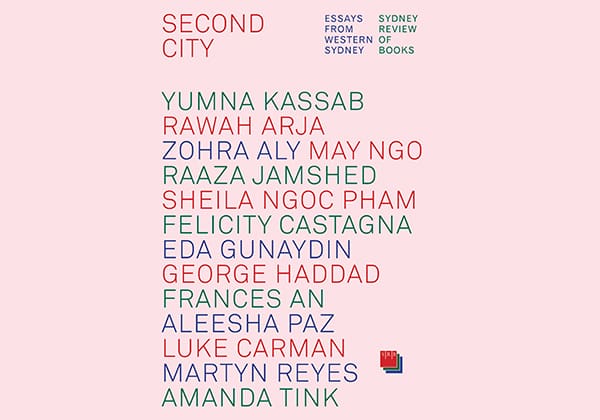Novelist Felicity Castagna opens her essay in Second City by summarising the difficulty of writing about Western Sydney. “The problem is that Western Sydney is a place,” she writes, “but it’s also an idea. And you can either write to that idea … or you can write against it.”
This is an apt way to begin the anthology, which comprises fifteen essays by Western Sydney writers. It underlines the double-meanings at play when we talk about the West, which is both a real place and an imagined one, a site of lived experience for people who come from it and an image in the minds of those who don’t.
Writers from the West who have entered Sydney’s literary mainstream in the past decade have resisted this image, writing against the damaging representations to which our community has long been subject. This has been “important work,” Castagna reminds us, “political work,” but it’s also work that is nearing completion. The next task for Western Sydney writers, Castagna suggests, is to write the West with complexity, to turn from what it isn’t and engage with the more difficult question of what it could be.
Such is the work that Second City promises to perform, a standard that many of its contributors rise to over the course of this collection. There is ‘Raise Your Needles’ by Aleesha Paz, a brilliantly inventive essay that traces the history of public knitting to make oblique reflections on the state of gender politics. There is Sheila Ngoc Pham’s ‘An Elite Education,’ a study of race, education, and class that gives a fascinating comparison of Pham’s family, who are liberal-voting, middle-class and Australian-Vietnamese, with her white husband’s: “though ours is a relationship of equals, there’s one notable difference: I’m not the first in my family to receive a university education.” Then there is Eda Gunaydin’s ‘Second City,’ an ambivalent critique of gentrification that laments the growing middle-class influence in Western Sydney while recognising that no ‘original’ West can be restored without radical colonial remediation.
The essays are at their best when they shimmer with this kind of complexity, the recognition that the counter-narratives we tell about our community can sometimes fray. Gunaydin and Ngoc Pham are right, of course – we cannot embrace any political imperative to ‘reclaim’ the West without recognising that it wasn’t ours in the first place, and intersections between race and class are indeed slippier than they once were. Admittedly, some of the essays fall short of this rigour: George Haddad’s ‘Uprooted,’ which relates the story of a drug-addled stranger making a barbed allusion to Haddad’s Middle Eastern appearance, beautifully renders the loneliness of being othered in one’s own country, yet misses an opportunity to explore the tensions between racial and class-based power underpinning this moment. Haddad is looking down at this man from his Inner West terrace, he is the one with a livelihood and education while the other pushes a stolen trolley from the Marrickville Metro. Exploring such ironies would return class to the conversation in fascinating ways, and would also illuminate the reality that class mobility cannot protect against the pain of casual racism.
Second City’s call for a shift in Western Sydney writing is a welcome one. As Castagna recognises, we need writing that pushes away from the relatively simple work of resisting stereotypes and “opens the deep work,” as she writes, “that hesitation requires us to engage in.” The exciting thing about this collection is that it hands this work over to the community: the essay stops “when it feels itself complete,” writes Theodor Adorno, “not when there is nothing left to say.”





